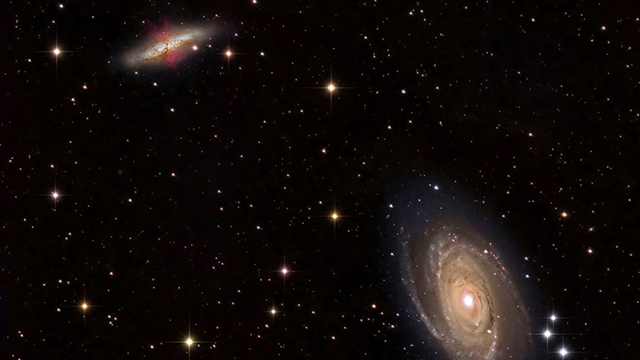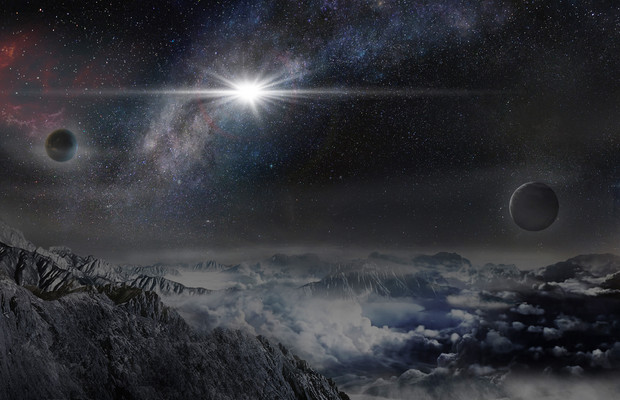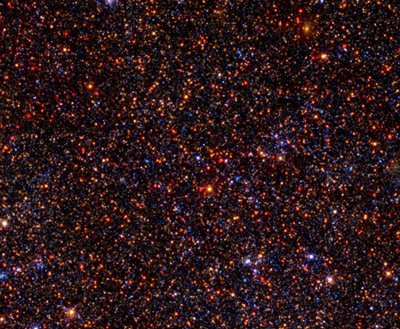搜索结果: 1-15 共查到“理学 Milky”相关记录59条 . 查询时间(0.078 秒)


Astronomers using the Atacama Large Millimeter/submillimeter Array (ALMA) have revealed an extremely distant and therefore very young galaxy that looks surprisingly like our Milky Way. The results are...

VLBA Measurement Promises Complete Picture of Milky Way(图)
VLBA Measurement Complete Picture Milky Way
2017/10/26
Astronomers using the National Science Foundation’s Very Long Baseline Array (VLBA) have directly measured the distance to a star-forming region on the opposite side of our Milky Way Galaxy from the S...

In a first-of-its-kind analysis, Northwestern University astrophysicists have discovered that, contrary to previously standard lore, up to half of the matter in our Milky Way galaxy may come from dist...
Milky Way-like Galaxies in Early Universe Embedded in 'Super Halos'
Milky Way-like Galaxies Early Universe Embedded Super Halos
2017/3/30
By harnessing the extreme sensitivity of the Atacama Large Millimeter/submillimeter Array (ALMA), astronomers have directly observed a pair of Milky Way-like galaxies seen when the universe was only e...
Astronomers observe early stages of Milky Way-like galaxies in distant universe
Astronomers early stages Milky Way-like galaxies distant universe
2017/3/30
For decades, astronomers have found distant galaxies by detecting the characteristic way their gas absorbs light from a bright quasar in the background. But efforts to observe the light emitted by the...
New delta Scuti:Rare pulsating star 7,000 light years away is 1 of only 7 in Milky Way
New delta Scuti pulsating star 7,000 light years 1 of only 7 Milky Way
2017/3/13
The star is one that pulsates and so is characterized by varying brightness over time. It’s situated 7,000 light years away from the Earth in the constellation Pegasus, said astronomer Farley Fer...
A better way to simulate accretion of the supermassive black hole at the center of the Milky Way is developed by PPPL and Princeton scientists
simulate accretion supermassive black hole Milky Way developed PPPL Princeton scientists
2017/1/9
Scientists at Princeton University and the U.S. Department of Energy’s (DOE) Princeton Plasma Physics Laboratory (PPPL) have developed a rigorous new method for modeling the accretion disk that feeds ...

What is 10 miles across,but powers an explosion brighter than the Milky Way?(图)
10 miles across explosion brighter the Milky Way
2016/1/22
Right now, astronomers are viewing a ball of hot gas billions of light years away that is radiating the energy of hundreds of billions of suns. At its heart is an object a little larger than 10 miles ...
What is 10 miles across,but powers an explosion brighter than the Milky Way?
10 miles across explosion brighter the Milky Way
2016/2/22
Right now, astronomers are viewing a ball of hot gas billions of light years away that is radiating the energy of hundreds of billions of suns. At its heart is an object a little larger than 10 miles ...
Event Horizon Telescope Reveals Magnetic Fields at Milky Way's Central Black Hole
Telescope Magnetic Fields Milky Way Central Black Hole
2015/12/14
Most people think of black holes as giant vacuum cleaners sucking in everything that gets too close. But the supermassive black holes at the centers of galaxies are more like cosmic engines, convertin...
Astrophysicists produce the first age map of the halo of the Milky Way
Astrophysicists first age map Milky Way
2015/11/12
University of Notre Dame astronomer Timothy Beers and his Galactic Archaeology group, which includes Notre Dame astronomers Daniela Carollo and Vinicius Placco, have led an international team of resea...
Milky Way-Like Galaxies May Have Existed in the Early Universe
Milky Way-Like Galaxies Early Universe
2015/8/13
A new, large-scale computer simulation has shown for the first time that large disk galaxies, much like our own Milky Way, may have existed in the early days of the universe.

Study of Andromeda's stellar disk indicates more violent history than Milky Way(图)
Andromeda's stellar more violent history Milky Way
2015/1/20
A detailed study of the motions of different stellar populations in the disk of the Andromeda galaxy has found striking differences from our own Milky Way, suggesting a more violent history of mergers...
Warm-hot gas in and around the Milky Way: Detection and implications of OVII absorption toward LMC X-3
LMC X–3 ISM
2014/12/24
X-ray absorption lines of highly ionized species such as O VII at about zero redshift have been firmly detected in the spectra of several active galactic nuclei. However, the location of the absorbing...


